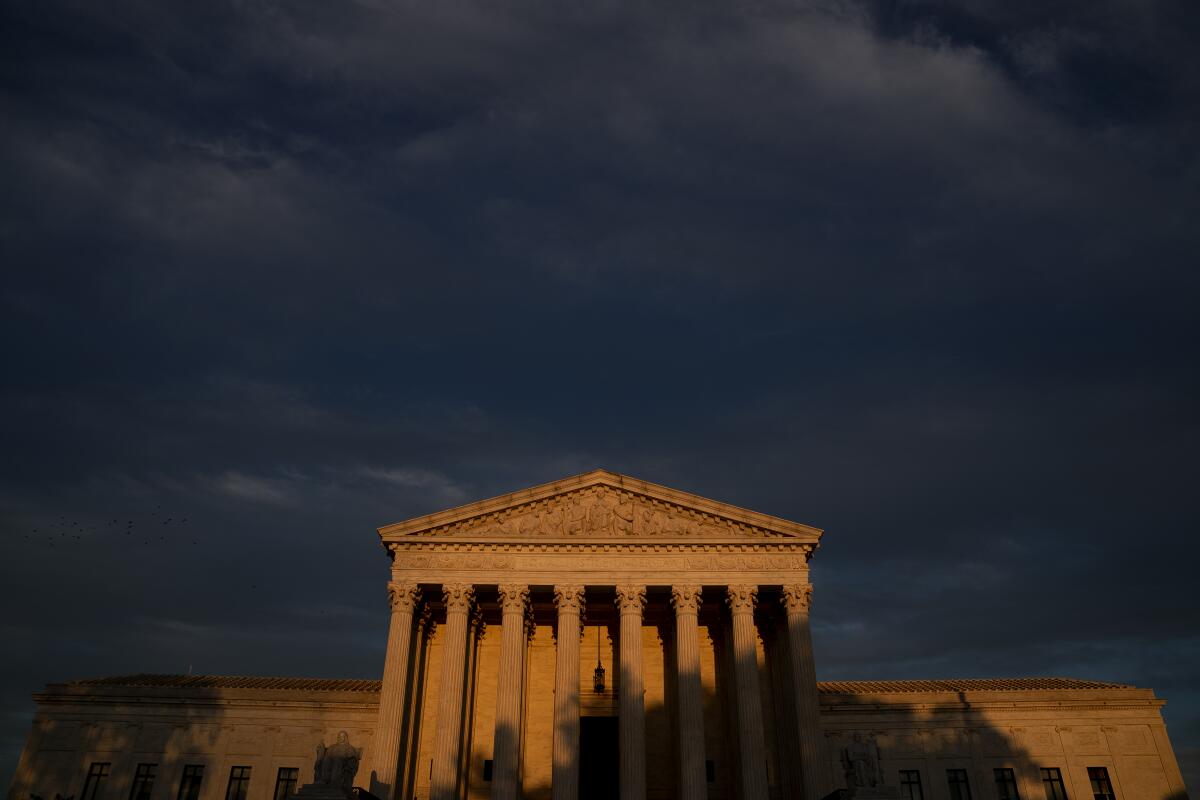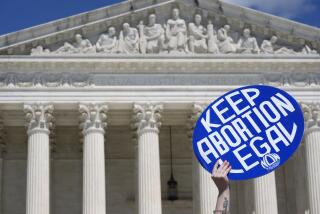Polls: Most Americans support the right to abortion, but many are also OK with 15-week limit

- Share via
WASHINGTON — New opinion polls show that while Americans remain divided over abortion, most do not entirely agree with either side in a case heading to the Supreme Court next month.
The justices are preparing to hear a case from Mississippi, whose officials are defending its 15-week limit on abortions and urging the repeal of Roe vs. Wade.
Abortion rights advocates argue that if the 15-week limit is upheld, the court will have overturned the landmark 1973 ruling. Under that precedent, abortions have been legal through about 24 weeks of a pregnancy, the point when a fetus can live outside the womb.
A Marquette University Law School poll released Wednesday found respondents by a 2-1 ratio said Roe vs. Wade should not be overturned.
But when survey respondents were asked if they would favor or oppose a ruling to “uphold a state law that (except in cases of medical emergencies or fetal abnormalities) bans abortions after the 15th week of a pregnancy,” 37% said they favored upholding it, while 32% said they would oppose such a ruling.
It is a result that pollsters have long observed if respondents are asked several questions about their views on abortion.
A Washington Post-ABC News poll released Tuesday also found strong support for Roe vs. Wade. Asked if this ruling should be upheld or overturned, the respondents said it should be upheld by 60% to 27%.
Marquette has been doing regular polling on the court, and in September, 40% said they favored upholding a 15-week limit while 32% opposed it.
“This is in line with much national polling on abortion over the years, which consistently finds support for maintaining Roe and a right to an abortion, but accepts a variety of restrictions including on the timing of abortions, as in this case,” Marquette’s pollsters said.
The court will hear arguments in the case Dobbs vs. Jackson Women’s Health Organization on Dec. 1.
The threat to Roe has arisen not from changes in public opinion but in the makeup of the court.
Before 2017, the court had three veteran conservatives — Chief Justice John G. Roberts Jr. and Justices Clarence Thomas and Samuel A. Alito Jr. — who were skeptical of abortion rights.
In his first year as a justice, Thomas voted to overturn the abortion right in the 1992 case of Planned Parenthood vs. Casey.
The three veterans have been joined by three appointees of President Trump — Justices Neil M. Gorsuch, Brett M. Kavanaugh and Amy Coney Barrett — who supporters believe will vote to overturn Roe vs. Wade if presented the opportunity.
That prospect arose last year with the death of Justice Ruth Bader Ginsburg in September. Three months before, Mississippi’s Atty. Gen. Lynn Fitch had filed an appeal petition asking the court to revisit the “strict viability” rule and uphold its proposed 15-week limit on abortions. Doing so would “not require the court to overturn Roe,” she wrote.
But Barrett had replaced Ginsburg when the court met behind closed doors to consider the appeal. After months of delay and uncertainty, the court announced in May it would hear the Dobbs case and decide the question raised by Mississippi: “whether all pre-viability prohibitions on elective abortions are unconstitutional.”
However, Mississippi’s top attorney then raised the stakes. “Roe and Casey are egregiously wrong,” she told the justices in July, and they should be overturned at once.
Meanwhile, abortion rights advocates also argue that the court has no option but to uphold or strike down the right to abortion.
“If the court upholds the ban, it is overruling Roe and Casey, even if it doesn’t use those words,” said Julie Rikelman, an attorney for the Center for Reproductive Rights, who will represent the Jackson women’s clinic.
She said the viability rule set in Roe was clear and workable. “Without that clear line, states could ban abortions at any point in a pregnancy,” she said.
More to Read
Get the L.A. Times Politics newsletter
Deeply reported insights into legislation, politics and policy from Sacramento, Washington and beyond. In your inbox twice per week.
You may occasionally receive promotional content from the Los Angeles Times.











